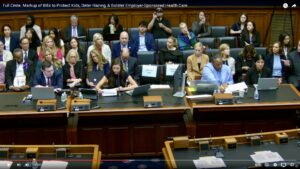Washington, DC – The U.S. House Committee on Education & the Workforce today advanced, by a 28-2 vote, the bi-partisan “Stop Campus Hazing Act” (H.R. 5646). The measure will amend the Jeanne Clery Act to provide that institutions of higher education 1.) disclose crime statistics for hazing, 2.) publicly list student organizations found responsible for hazing, and 3.) offer a research informed hazing prevention program. It now advances for consideration by the full House.
The bill’s lead sponsor Rep. Lucy McBath (D-GA) said “It’s about empowering students and families so that they can make an informed decision for themselves”. She also thanked the numerous families of hazing victims who were a driving force behind the bill, which represents a combination of the REACH Act and the END ALL Hazing Act from prior Congresses.
Co-sponsor Rep. Glenn Thompson (R-PA) called the measure “A piece of legislation that is long overdue.” He further said it “will lead to real impactful and meaningful change as we look to end hazing on college campuses around the country.”

The Committee also adopted a technical amendment to the bill that offers clarity on how to count hazing incidents, define student organizations, and provides for a timeframe to implement the bill. Institutions will begin collecting data for statistics beginning on the January 1st that follows enactment of the bill, begin including that data in reports 2 years after the date of enactment, and make the disciplinary findings first available within 12 months following enactment.
The Stop Campus Hazing Act is endorsed by The Clery Center; StopHazing; the Anti-Hazing Coalition (including the Hazing Prevention Network, Association of Fraternal Leadership & Values, Association of Fraternity/Sorority Advisors, National Panhellenic Conference and its member sororities, and the North American Interfraternity Conference and its member fraternities); the College Safety Coalition; and SAFE Campuses, LLC.
